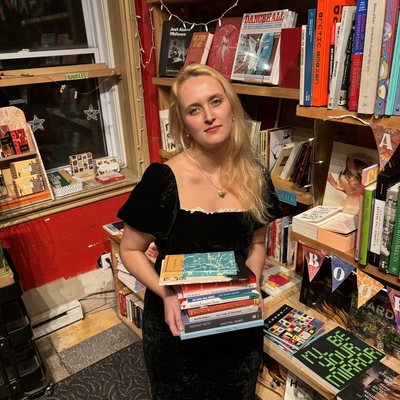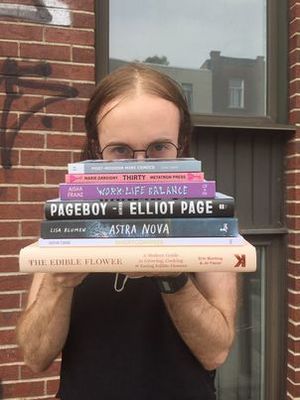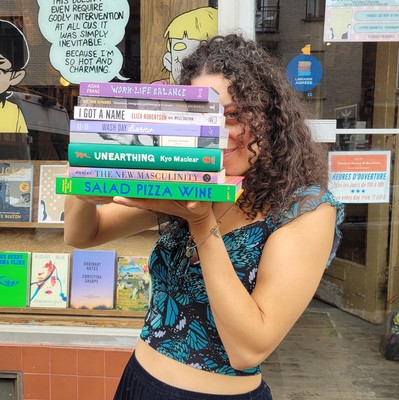Staff Picks 2020 - Rachel
November 7, 2020
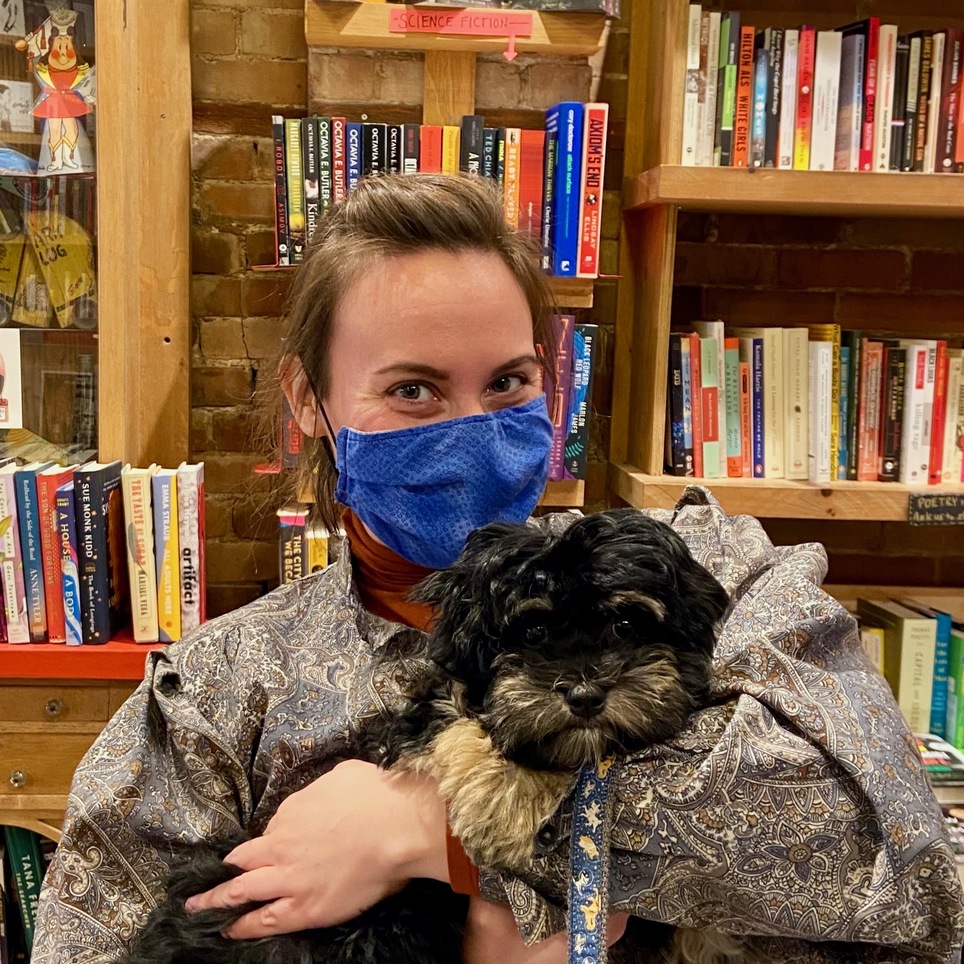
Unlike many of my super colleagues, I was away from the bookstore for the first wave of the lockdown. So, my reading year was a little different than normal: I got a chance to catch up on a bunch of backlist titles (standouts include Blood Sisters, The Essential Dykes to Watch Out For, & The Broken Earth trilogy), as well as to explore the world of audiobooks (thanks, Libro.fm!). That said, once I was back at the bookstore I gobbled up all the new releases, making this year just as hard as any to pick favourites!
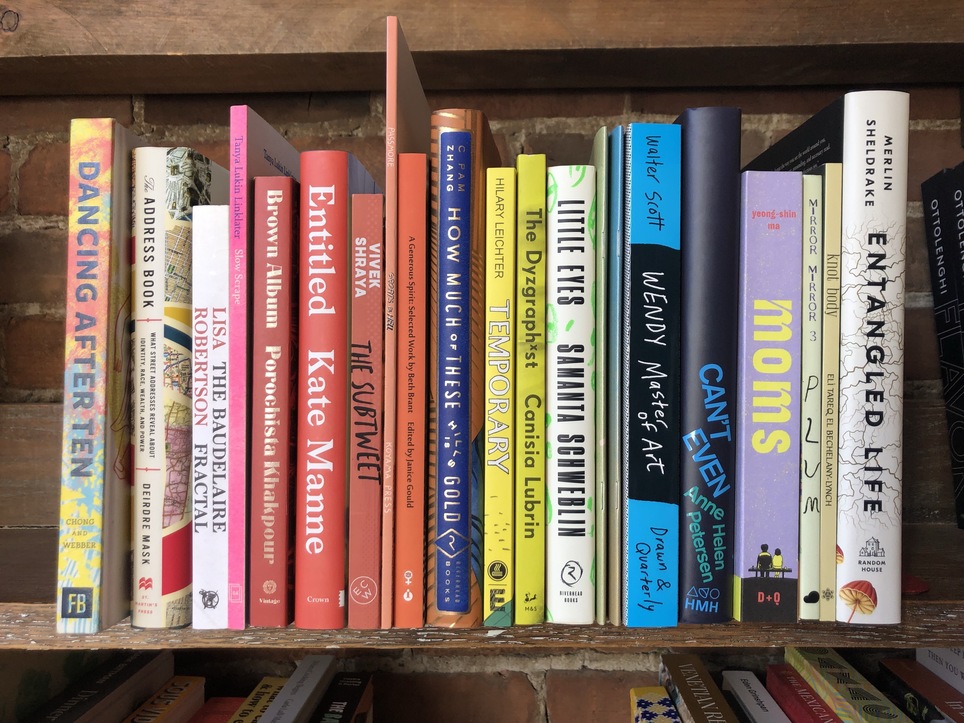
GRAPHIC NOVELS
Think of Moms as a Korean Sex and the City where the characters have both responsibilities and limited budgets. Moms stood out to me for its bold presentation of motherhood as just a facet of these women’s lives, and not the most important. These moms are busy, funny, and doing their best to not let their kids nor their boyfriends slow them down. There’s a refreshing absence of moralization or reassurances of their status as “good” mothers. And yet, readers will have no trouble feeling sympathetic towards these characters: I was hooked on all the ups, downs, squabbles, and successes.
DANCING AFTER TEN by Vivian Chong & Georgia Webber
Dancing After Ten is a stunning collaborative accomplishment. How do you depict visually the changes that lead to blindness? The book begins with Chong’s drawings, slowly mixing with more of Webber’s art. In her debut, Dumb, Webber developed a style of firm black-and-white illustrations with an unbordered red accenting and interplaying the main narrative. In collaboration with Chong, this approach is infused with new power: Chong’s drawings depicting the emotionality of the events are superimposed over the pair’s more conventional panels.
WENDY, MASTER OF ART by Walter Scott
Wendy is back! I’m a long-time fan of Scott’s laugh-out-loud series. In the latest installment, she starts grad school at the University of Hell (which just so happens to bear an uncanny resemblance to my hometown, Guelph). Without losing her signature art-world humour, Wendy transforms over the course of the book, finding herself and even starting to grow up a bit along the way.
SPORTS IS HELL by Ben Passmore
Sports is Hell takes place on the eve of a big sports game, in a city charged up with tension. Passmore’s signature style of blending satire with piercing insight about racism in the USA is triumphant. Over the course of a single evening, excitement mixes with violence as we follow several characters through flooded streets and moral judgements. There won’t be any clear winners here.
NON-FICTION
THE ADDRESS BOOK by Deirdre Mask
Most works of non-fiction give us the chance to pursue an interest, The Address Book provides the opportunity to develop one. This book perfectly melds knowledge and entertainment together by covering an unusual topic—street addresses—in a divergent and satisfying way. Mask’s book is a treasure chest of anecdotes and analysis, spanning centuries and covering regions world wide. The book’s breadth is its charm, yet it does not lack for depth: Mask plots out ties to broader social and geopolitical issues throughout. The Address Book will change the way you navigate urban environments, and leave you with endless conversation starters besides.
BROWN ALBUM by Porochista Khakpour
Khakpour’s latest collects decades of essays she’s written that flutter around and amidst themes of identity, migration, and belonging. The work’s brilliance lies not only in Khakpour’s insights in each piece, but in the way that, read as a whole, the later pieces begin to erode the foundations laid earlier in the book. By calling out the performative and placating effects of personal essays, Khakpour unsettles neat anecdotes and the tidiness of the trajectory of accomplishment usually implied by such collections. More than just a breath of fresh air, this work gusts powerfully into the personal essay genre.CAN'T EVEN by Anne Helen Petersen
Some writers analyze millennials, Petersen reads their pulse. Her analysis of burnout goes wide and deep, mixing sharp analysis of historical ideologies with moving interviews. Readers across generations will identify the cultural changes she depicts, making it an equally good read for boomer parents as the burnt-out millennials Petersen focuses on. I also had the immense pleasure of discussing this book with Petersen at one of D+Q's online events, which only made me love it more.
Kate Manne’s new book, Entitled, is as relentless as the phenomenon it describes. A timely follow-up to her debut, Down Girl, which lays out the logic of misogyny, Entitled points towards why we experience such phenomena so damn often. Manne traces her main thesis: that there are certain behaviours that men tend to feel entitled to, from women, through a staggering number of scenes where this dynamic plays out. Her writing also stands out as an example of how cis feminist scholars can write about gendered dynamics in a considered, trans-inclusive way.
ENTANGLED LIFE by Merlin Sheldrake
Entangled LIfe is science writing at its best: Sheldrake makes it easy to understand core concepts of mycological science, their implications for everyday life, and the imaginative futures they inspire. A book that is as playful as it is rigorous, the various topics have impressive reach, much like many of the organisms Sheldrake studies. A thoroughly pleasant and engaging read.
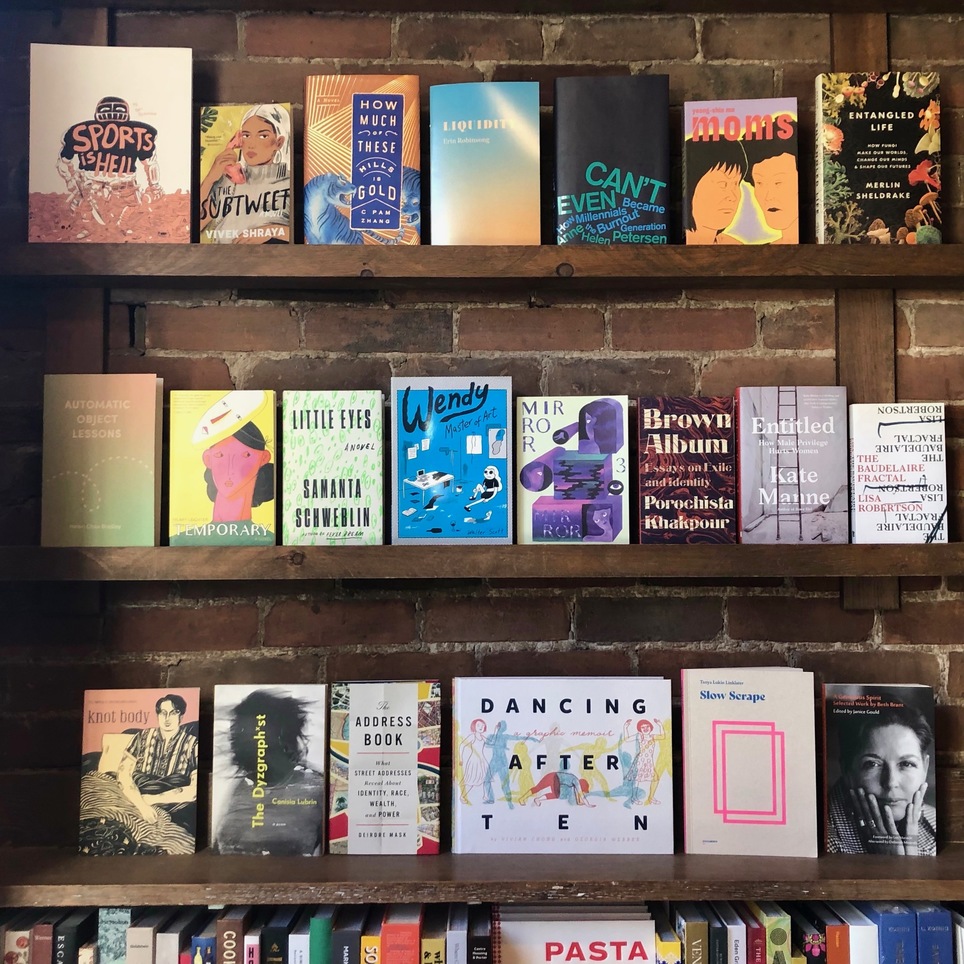
POETRY
KNOT BODY by Eli Tareq El Bechelany-Lynch
In a series of poems, letters, and an essay, Knot Body takes us through the extremes and normalcy of living with chronic pain, and, importantly, the intersections of gendered illness with queer life. When I brought home this book I read it over for days, and continue to revisit it. These poems address the reader plainly and do not shy away from complexity. The poetics here are precise, yet call readers continually into reflection and responsibility. Following all these threads, I find myself tied up in them. Stay here, tangle.
AUTOMATIC OBJECT LESSONS by Helen Chau Bradley
Automatic Object Lessons is a series of poems based on sentences from language-learning programs. As a result, these poems cluster around our basic needs: food, connection. A clever line break is disruptive, there are spaces that flood with all the things we don’t quite say. There are many question marks, yet few periods: the statements lie open. Nevertheless, these poems can over the course of a line rapidly plummet you towards reflection.
SLOW SCRAPE by Tanya Lukin Linklater
The title of this book sent chills down my spine, and the lucidity of the writing kept them rolling through me. Slow scrape is a book you can wander through steadily. You might waiver. Love and trauma, colonization and continuity hang in relation, like a mobile. Lukin Linklater is an imaginative observer, adding warmth to the events and relations that populate the book.
LIQUIDITY by Erin Robinsong
Reading this chapbook, I was struck first by the beauty. Robinsong’s lines shift seamlessly between raw everyday details and those a little further out of reach. The hope here is melded to disappointment: over and over readers glimpse the regularity of destruction, climatic urgencies. Robinsong’s position here is strong, yet I find myself unable to wallow in it. There is only a mucking through, with room to pause for chats with friends, for colours, for pleasure.
THE DYZGRAPHXST by Canisia Lubrin
This is a book of reckoning, a book that does not shy away from passing its emotionality on to readers. It will leave splinters in you. As language unravels, Lubrin’s poetics spew anticoloniality. Plurality, race, history, legacy, environment, earth, family, economy, memory, and more are all set in motion, as if nearly the whole world is churning between these covers.
FICTION
LITTLE EYES by Samanta Schweblin
I gasped my way through this book. This is speculative fiction at its most terrifying, a novel that takes its premises one step further than my nightmares would ever. Schweblin takes her signature eeriness to new heights in this novel, about the intersection between global connectivity and the false friendliness and commodification of surveillance. As we increasingly find ourselves living our lives through streaming video, this book couldn't be coming at a more perfect time: but that will only make it all the more disturbing.
TEMPORARY by Hilary Leichter
A temp worker drifts from job to job to job, adjusting her persona to every role and dreaming of permanence. She's one of a long line of temp workers, an inescapable underclass. From high rises to pirate ships, we pass through more and more absurd roles. Temporary is imaginative and funny. I read this one at the start of Isolation measures, which made it seem a little more like a bleak prophecy than the adventurous satire it might have seemed just months ago, but either way it's a delightful escape.
THE SUBTWEET by Vivek Shraya
The Subtweet is FUN and DRAMATIC. Edge of your seat, oh-no-she-didn't dramatic. I dropped all the other books I was reading as soon as I started this one, because it was too juicy! And, even with all the drama, the characters still feel relatable and true to life. When I heard the premise, a music industry friendship gone sour over a tweet, I was skeptical: I'm pretty out of touch about the music industry, and I'm so out of touch with twitter that I had to look up what a subtweet was. But Shraya's writing is super accessible and I had no trouble diving right in.
A GENEROUS SPIRIT by Beth Brant
I hadn't heard of Beth Brant until this book showed up on the Lambda Literary Awards shortlist. I'm so glad I have now. Brant writes slice-of-life stories: some centralize her Mohawk and Two-Spirit identities, others go beyond personal experience with radical empathy. Each of the stories and essays in this collection shows not only a vast range of emotions, but also the depths that those feelings may contain. The title of this book is so fitting: Brant's generosity radiates throughout.
HOW MUCH OF THESE HILLS IS GOLD by C Pam Zhang
How Much of These Hills is Gold sucked me right back into that childhood feeling of reading historical fiction where anything is possible, where if you think about things the right way the past and future might get a little better at the same time. In a moving story of family and intergenerational trauma, Zhang tells the story of a Chinese family living in the American West in the early gold rush days. It's a testament to how present Chinese families were in this history. A standout feature, is how casually queer the characters are. There's a tendency in works that explore queer histories to justify why things are a certain way, that they meet realism thresholds. There's none of that here, and that's what makes it feel so very true.
THE BAUDELAIRE FRACTAL by Lisa Robertson
As the protagonist of The Baudelaire Fractal, a young poet, fashions her adult identity, particular identity is given to her clothes, her various coats. We see pleasure as a source of power, a pathway to independence. There’s an empowering irreverence towards what “ought” to be important, and a true delight in surprise, impulse, and change. Robertson gifts us with an assured affirmation that a young woman’s greatest love can be herself.
